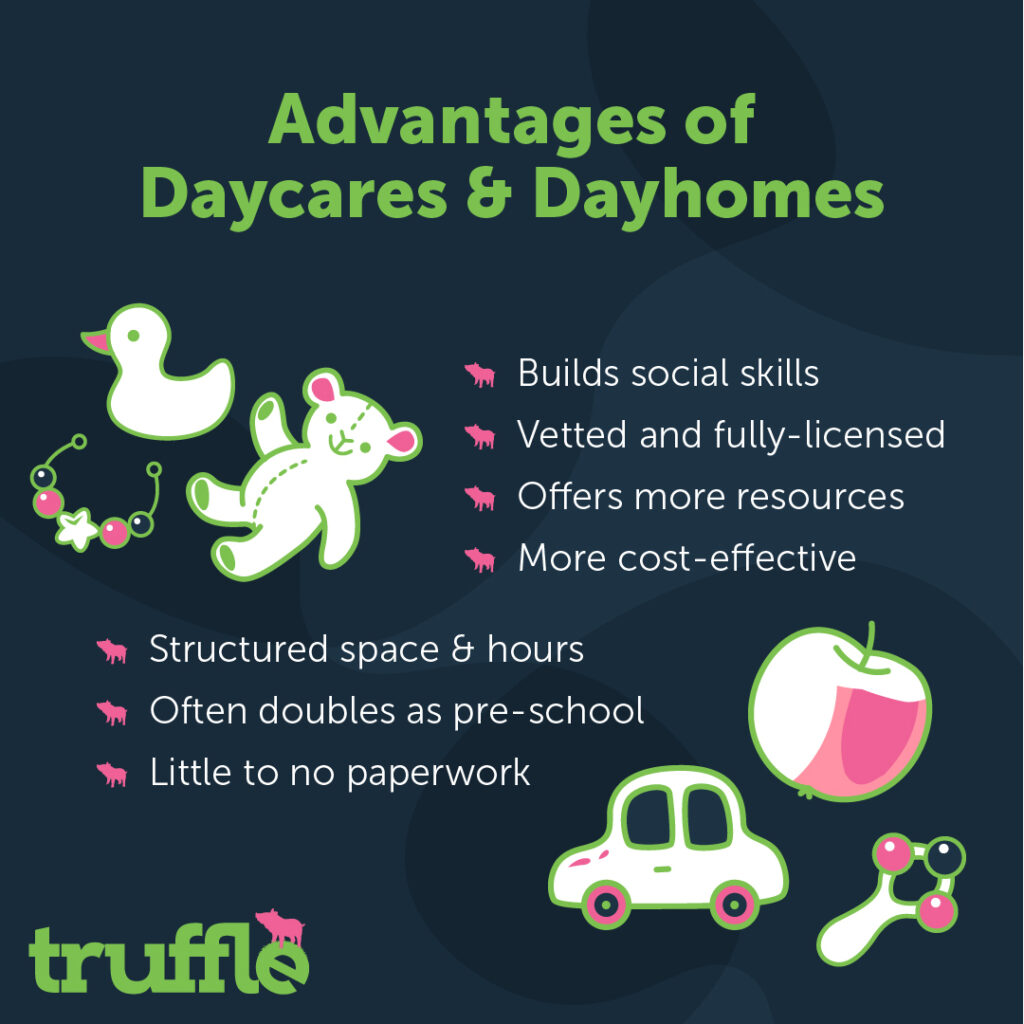Every parent knows that searching for the perfect childcare solution for their family can be a long and stressful process. Finding a healthy mix of availability, cost, values, and location is a tightrope to walk, and you may need to be prepared to make some tough decisions. Luckily, there are a few different options for childcare services that you can choose from, so knowing the differences between them is a good place to start.
What kinds of childcare services are available to you? There are quite a few options that you can look into when it comes to childcare options including dayhomes, daycares, nannies (live-in or external ones), part-time babysitters, family members, unparented kids programs in your community, and more! However, to give a good start to this search and help simplify the beginning of this process, we will only be focussing on “the big three” – dayhomes, daycares, and nannies.
Before You Start: What Should You Be Asking Yourself?
Here are some of the questions you may want to ask yourself when selecting the right childcare services for your child:
- What is my monthly/annual budget for childcare services?
- Do I prefer my child to socialize with other kids, or do I want to focus on one-on-one attention?
- How flexible can I be with pickup/drop-off times?
- Do I only need childcare services or could I also benefit from some extra help or company around the house?
- How early do I need to get childcare services arranged?
- How much control do I want over my child’s environment or development?
- Is a live-in caregiver ideal for my family?
- What childcare option supports the ideal lifestyle I envision for my family?
Every childcare option offers its own set of pros and cons. Let’s take a deeper dive into what is offered by each of them so that you can have a better understanding of what to expect.

Licensed Dayhomes and Daycares
Before jumping into the analysis of these three options, it is important to keep in mind that there is no “wrong” choice when it comes to childcare providers as long as you select the option that works best for you and your family’s needs. Having said that, let’s outline the differences between a licensed dayhome and a daycare, as well as some pros and cons that can come from both.
1. Health and Safety
A licensed dayhome is generally hosted in a caregiver’s home or another private residence. They are typically monitored by a family dayhome agency to ensure the health and safety of the children attending. In Alberta, the Alberta Human Services collaborates with approved dayhome agencies that not only supervise dayhome operations but also provide training to dayhome providers. However, there is no control over who can access the dayhomes during its normal operation hours, so parents have to trust the caregiver and environment of the dayhome at face value.
On the other hand, a daycare centre is located in a separate facility as opposed to a home and is structured similarly to a school. Daycare facilities are heavily regulated by the Child Care Licensing Act and the Child Care Licensing Regulation. These regulations not only ensure the children’s health and safety needs but also guarantee that the people that will be in contact with your child have passed a background check and that the caregivers have a minimum level of early learning education, among others.
2. Reduced number of kids:
In dayhomes, the number of children is very limited (up to six children with a limit of three kids under 3 years old and no more than two kids under 2 years old). This rule includes the dayhome caregiver’s own children provided they live in the same home. This reduced number of children and the fact that the services are located in a house provides the children with a cozier home-like setting that they can benefit from.
In daycares, the number of children is variable and normally way higher than the number of children in dayhomes. The limit of children for daycares is just limited by the teacher-child ratio per age group and the size of the facilities, ranging from as little as 10-15 kids to over 100.
3. Structured routines:
Daycare centers typically have a predefined routine for meals, naps, playtime, and other developmental activities. They may also have early learning programs and a curriculum that they follow throughout the year. A dayhome’s approach may have different levels of structure depending on the vision of the caregiver in that dayhome. Some dayhomes are highly structured, similar to daycares, while others simply follow the flow of the kids on that day.
It is worth noting that studies have shown that predictable routines have a positive impact on children’s behaviour, helping them navigate through the day by knowing exactly what to expect and what comes next. Therefore, it may be beneficial to look into dayhomes or daycares that have a clear schedule and routine throughout the day.
4. Caregiver Turnover:
Dayhomes are typically run by the homeowner and seldom have another caregiver present for support. As a result, the risk of caregiver turnover is very low, allowing the kids to get to know their caregiver well and form a healthy and strong relationship. On the flip side, some daycare centres may be more prone to employee turnover, which may have an impact on your child once they are attached to their caregiver.
5. Social interaction:
Overall, by selecting any of these two options, your child will benefit from the everyday interactions with other kids, developing their social skills and communication capabilities at a young age. They will be able to learn how to problem-solve, share, and otherwise play and learn well together with other kids while their minds continue to grow and their personalities emerge.

Nannies
When it comes to understanding the dynamics of working with a nanny, there is no better description than what we have all seen in the timeless 1964 classic Mary Poppins. Your nanny may not fly in on an umbrella, but this movie depicts the role of a nanny very clearly. The idea of a nanny is to have someone who will come to your home, take care of your child and, in some instances, take care of other housekeeping responsibilities such as cooking or cleaning.
Some of the advantages of hiring a nanny are that your child will be taken care of in the comfort and security of your own home. This makes it more convenient for some parents who may not have the time to drop off their kids at a childcare facility before work. Another advantage is that your kid will have one-on-one exclusive attention from the caregiver, allowing them to create strong attachments.
However, there are some disadvantages to consider as well. Nannies usually require a larger family investment. In Alberta, the typical hourly rate for a nanny is between $15-25 per hour. Assuming an average of 8 hours per day, this investment could easily amount to $100-200 per day. In addition, nannies don’t usually focus on early learning education nor follow a development curriculum. They tend to be more exclusively focused on the safety and well-being of the child rather than early childhood development. Though looking for a nanny with proper early childhood education is an option, this may entail even larger investments.
Lastly, it is critical to ensure that your nanny has CPR, First Aid, Child Intervention Check, and a police background check performed before giving him or her access to your own home and your child.
The Choice
By now, you should have a good understanding of the basic characteristics of the three main childcare options. We hope that this article helps you make some educated decisions now that more and more families are choosing to enroll their children back into dayhomes/daycares or employing nannies as we transition back to our regular day-to-day lives post-pandemic. As mentioned before, there is no right or wrong option as long as you select what is best for your family’s specific needs.
Which one of the three options do you personally prefer? We encourage you to comment your thoughts below or to fill our contact form if you want to learn more. And if you are ready to start looking for high-quality dayhomes and daycares in your city, please consider using Truffle’s portal for access to all the different options with just a few clicks. We are excited to continue supporting you with your childcare services needs!
Author: The Truffle Team

